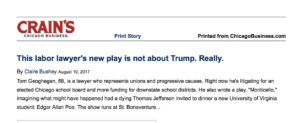Crain’s Chicago Business talks with Monticello playwright
Tom was profiled in Crain’s Chicago Business last week. You might need to be a subscriber to read it.

Tom was profiled in Crain’s Chicago Business last week. You might need to be a subscriber to read it.

Third Coast Review takes a look at Monticello:
What if Edgar Allen Poe, a new student and earnest young writer at the University of Virginia, went to Monticello in July 1826 to help Thomas Jefferson with an important task. It could have happened, says playwright Thomas Geoghegan, who conjures this event in his play Monticello, directed by Anthony Irons.
The two-act play, staged in a Lakeview church basement, speculates on what might have happened. Marty Lodge plays the former president, who has suffered a stroke but is able to converse in French. His estate Monticello is deep in debt and his daughter Martha (Lori McClain) is afraid the family will lose the property. Since the approaching July 4 will be the 50th anniversary of the Declaration of Independence, Jefferson is expected to issue a statement confirming his masterpiece of revolutionary writing.
Jefferson’s nephew, Randolph (Glenn Garrabrant), is more than willing to buy the Monticello debt and take over the plantation, especially the slave Abby (Anji White). Randolph, a member of the Virginia House of Delegates, wants the former president to “clarify” his intent about the word “equal” (as in “We hold these truths to be self-evident, that all men are created equal”) and validate states’ rights in slavery over federal policy. Randolph has written his own clarification to the Declaration of Independence and he wants his uncle to sign it.
Into this hornets’ nest, Geoghegan speculates, steps young Edgar Allen Poe (Jeff Kurysz), who writes poems and stories and has an interest in science fiction. (He’s interested in space travel, specifically, traveling to the moon by hot-air balloon.) Jefferson was known to invite UVa students to dine with him and it may well have been Poe’s turn. Martha wants Poe to draft something close to Randolph’s clarification and persuade Jefferson to sign it and thus save Monticello and its slaves from being sold off.
Will Poe succeed in getting the increasingly ill Jefferson to sign something that will save Monticello? Poe, who says he is a confirmed abstainer, imbibes freely from Jefferson’s collection of fine wines and creates a document. A certain amount of magical realism pervades the hours leading up to Jefferson’s death on July 4, 1826. (That is not a spoiler; it’s history.)
Hedy Weiss at the Chicago Sun-Times has an excellent examination of Monticello…
Call it the “Jefferson conundrum.” And the issue is this: How could Thomas Jefferson, the Founding Father of this country who, at the age of 33, penned the Declaration of Independence (a document that declared “that all men are created equal, that they are endowed by their Creator with certain unalienable Rights, that among these are Life, Liberty and the pursuit of Happiness”) also spend his life as the owner of several plantations in Virginia that were worked by hundreds of slaves?
…Some historians have criticized the musical [“Hamilton] for what they consider to be an idealized depiction of Hamilton (who was by no means an abolitionist) and a vilification of Jefferson. Now, in his play, “Monticello,” which opens Aug. 6 in a world premiere production by Aurora Theatre Works Inc., Thomas Geoghegan, the distinguished Chicago labor lawyer and author with a longtime passion for theater, tries to come to terms with all the contradictions embodied by Jefferson in what is something of a fantasia rooted in fact.
And playing opposite Jefferson is none other than Edgar Allan Poe, the poet and short story writer known as a master of the macabre and an inventor of detective fiction.
Read the whole article at: http://chicago.suntimes.com/entertainment/with-monticello-lawyer-tries-to-come-to-terms-with-thomas-jefferson/
The Aurora Theater Works is officially a non-profit organization, which means donations to the production of “Monticello” are tax-deductible!
Please consider donating to our project today. It’s fast and easy, and will be incredibly helpful as we move forward into full production.